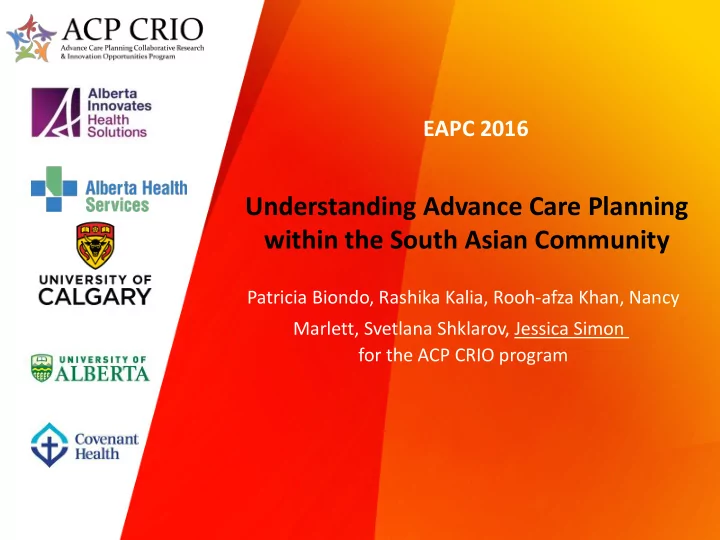

EAPC 2016 Understanding Advance Care Planning within the South Asian Community Patricia Biondo, Rashika Kalia, Rooh-afza Khan, Nancy Marlett, Svetlana Shklarov, Jessica Simon for the ACP CRIO program
Disclosure Physician Consultant, Advance care planning and goals of care, Calgary Zone, Alberta Health Services
Outline Context: Part of larger ACP CRIO research program Distinct method: Community members as researchers Findings and their application
Context: ACP CRIO research program Advance Care Planning and Goals of Care Alberta: A Population Based Knowledge Translation Intervention Study 2014 province-wide policy & framework Knowledge to Action Cycle, Adapted Graham et al. www.Ktclearinghouse.ca
Study Objectives Elicit perspectives on Advance Care Planning (ACP) within the South Asian Community: — Gain understanding of barriers and facilitators around ACP — Determine ways in which members of the community would like to engage in ACP
A diverse socio-cultural community Languages — Hindi, Urdu, Punjabi Religions — Hindu, Islam, Sikh
Methodology Patient and Community Engagement Researchers (PaCERs) are people with various health conditions/experiences, trained to design and conduct health research, using specific adapted methods of qualitative inquiry COLLECT REFLECT SET collect and analyse data: reflect on findings set the direction of the together with study together with field work, focus participants participants groups, narratives, or questionnaires Marlett et al. (2015). Building New Relationships in Research: A Model of Patient Engagement Research. Quality of Life Research, 24(5), 1057-67 (Patient Engagement Special Section). DOI 10.1007/s11136-014-0845-y.
Methods SET COLLECT REFLECT 15 women 8 family interviews 19 men & women Focus group 23 participants Age range 22-72 Narrative analysis
Set Learnings 1. Importance of Language & expressions of ACP Advance Care Planning Language “Old and Sick ” “Pulling the plug ” “Doctors ” “Organ donation ” “Wealth/Wills ” ACP is associated with Difficult decisions are Doctors are viewed with ACP relates to organ Securing assets is older, ill individuals who made by the family but high regard & have donation, with many understood as a key require support from spouse or oldest child has authority when making different views based on component of ACP the family final say end-of-life decisions religion, beliefs
Set Learnings 2. Power differentials Family Culture Power Differentials Healthcare Social providers Status
Collect “narrative scripts” Leave it to God Foreign Ideas Cultural Norms Too busy with life Don’t talk about it Wealth vs. Health
Collect “narrative scripts” “We don’t plan about death and severe health conditions as we believe it is not in our control. Discussing and preparing for it puts us in control rather than God and the higher power.” “When anyone in the family is faced with a difficult situation, everyone intuitively knows what their role is and what to do, and then right decisions are just made without us planning ahead.” “When I fall ill, I make sure that my finances are in order, so that my family doesn’t fight over it.” "When I don't know much about a new foreign idea, I simply cannot make any decisions, and then I ask for more information so I can deal with it." “When I anticipate any unfortunate scenario, I am immediately told to shut up and not to dwell upon it, so we don’t prepare for problems, we just face them.” “ I am so busy with making a living in Canada that I have no time to think of anything else that might be important in my life.”
Recommendations: from the Community & PACERs Respect cultural norms Include family members in discussions Forums & Seminars at religious/community centres Involve community leaders Encourage family doctor initiate Multipronged approach to accessing information “Alberta Health Care should write a letter asking and telling them their legal rights about their health decisions because we take them seriously like Revenue Canada.” Recognize & build on community & cultural capacity (family networks, community ties, shared norms) Tell stories to aid understanding
Literature & ACP CRIO Comparisons Themes consistent with literature (Con 2007, Health Canada; Ebrahim 2011, J Pall Care; Sharma 2011, J Gen Intern Med; Hofstede 1991 Cultures and organizations : software of the mind ; Millender 2011, J Contin Educ Nurs) Lack of shared conceptual models Recommendations echoed in World Café of community groups Creating report for stakeholders
Thank you Questions/Comments? Jessica.simon@ahs.ca www.acpcrio.org
Recommend
More recommend